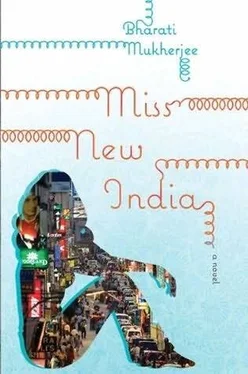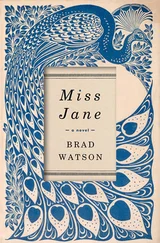In the meantime, she could enjoy something new, the buzz of desirability, being the center of attention. Until the young Lord Ram was found, nothing that could enhance her beauty would be denied her. No new sari would be held back. There would be trips to the gold store, to Calendar Girl Hair-and-Nails Salon, even to the fancy hotel restaurant, just to be put on public display with her parents. She might even win the marriage raffle: get money and good-looking children from a sweet-tempered and handsome husband with loving in-laws. Then again, she'd never heard of such a marriage.
But a girl could dream, couldn't she? She could believe that she was still in control and that the orchestrated tsunami of marriage preparation could be reversed, that she had the power to call it off.
Now that it was time to marry her off, her parents reversed nineteen years of harsh assessments and suddenly expressed guarded approval. She could be advertised as modest and pliable, a flawless embodiment of Bengali virtue. Of course, she couldn't cook, dance, sing, or recite Tagore's poetry. But at least she wasn't a modern, citified, selfish materialist girl. Bihar was a sanitized bubble, far from the debilitating distractions of modern city life. Until the marital ax fell, severing her from all of life's promise, she would be the center of everyone's attention.
The monsoon was building, growing ever closer.
Her parents mandated that jeans and T-shirts could be worn only inside the house, early in the morning. After lunch and a beauty nap and bath, she was to appear decorous in a freshly starched sari, hair braided and decorated with flowers, eyes emphasized with eyeliner, face whitened with powder, in expectation of unannounced visits. After all-in the mutual ambush of marriage negotiation-a boy's parents might drop by, ostensibly to view the goods but also to assess the general character of the family, the quality of housekeeping, the mother's modesty, the father's authority, the spontaneous hospitality, the obsequiousness of the staff, the absence of ostentation. Certainly there was very little ostentation to worry about, and no staff to speak of, except a woman who came every morning to sweep the floors and scrub the cooking utensils used the night before and a boy who cleaned the toilet every afternoon. At dinner, Anjali's chapatis would be smeared with extra ghee to enhance her radiance, and sweetmeats (such as raabri, rasmalai, rajbhog, expensive treats the Boses would buy only when they had guests) heaped on her plate in the hope that she would add a little more weight in all the right places.
Most evenings, in the quiet hour when her father sat in the only comfortable rattan chair in the front room of their rented apartment, drinking his three pegs of local whiskey before dinner, and she and her mother sat on the floor, her mother darning frayed shirt collars and cuffs and Anjali tapping out hit Bollywood songs on the family's heavy harmonium, with its chipped keys and scuffed bellows, the dreams were almost enough.
"I shall find a good boy this time," Mr. Bose promised his wife regularly. "Your father wore out the soles of his sandals looking and looking before he found me. I am prepared to do the same."
He answered scores of matrimonial ads in the two Bangla-language papers. Angie didn't expect him to snare a single worthwhile candidate-he was a railway clerk, after all, not even a regional director-and the fact that he was still restricting his attention to a tiny fraction of available boys was just fine; her back-door escape plan was not in jeopardy. All the same, some siesta hours while her mother snored in bed next to her, she allowed herself to daydream that maybe a Bollywood hunk, a Shah Rukh Kahn or Akshay Kumar, would find her irresistible during the marriage interview and would deposit her in Mumbai, Canada, or America. In daydreams, even Dubai seemed bearable.
Everything about the Bose flat, especially the front room, where any interview would have to take place, depressed her. This room, the larger of the two, was furnished with a mattress-covered wooden chowki, which served as seating for visitors and as a bed for her father, a glassfronted bookcase, and two wooden office chairs with uneven legs. A grimy, rolled-up tent of mosquito netting was suspended above the chowki by its four loops from nails hammered into the plaster walls. The only wall hangings were two calendars, a current one with a flashy picture of Goddess Durga astride a lion, and a useless but auspicious one from ten years earlier, which had been current in the year her father had received his last promotion.
Her parents' continual squabbling made it hard for her to improvise bouncy Bollywood beats on the old harmonium. It was her lone feminine grace, hence, important.
"I'm not despairing yet of finding a decent jamai," Mr. Bose kept saying between sips of whiskey. "If your father could find someone like me, I can find someone equally good."
The silence was deafening.
"My father received many, many decent proposals," Mrs. Bose protested. "From day one. I could have married an actuary and lived in a big house in Patna."
"No actuaries," Anjali declared. "No dentists, no professors either."
"Who asked you?" Mrs. Bose shouted.
"And nobody from an armpit town like Patna!"
Mr. Bose made a menacing gesture, slipping the sandal off his left foot and holding it up as though he meant to strike her. "You think you can give ultimatums to your elders? Maybe I should marry you off to a village schoolteacher-would you approve of that? Iron his dhoti under a banyan tree every morning?"
"She's an obedient girl. She'll do what you tell her."
"You think my family and my salary are not good enough for an actuary or a tooth puller?"
"She is a Vasco graduate."
"Useless." Mr. Bose snorted.
"Drunk," said Mrs. Bose.
"Why only Bangla ads?" Angie demanded. "Why not English papers? I'm too good for any guy taking out ads in any Gauripur paper."
"You see what state you've reduced me to, woman, by not bearing sons? All my brothers are fathers of sons. But me? Two donkeys for daughters." He would never own a house, not with two daughters, two dowries, the larger one already wasted.
"Ill luck is ill luck." Mrs. Bose clutched at her throat. It was not the proper time for Anjali to bring up the known fact that sex determination is male-linked. "But this one isn't donkey-headed like…"
Mr. Bose was on a roll. "Donkey for wife, donkeys for daughters!"
"You're not wearing out your sandals, you're wearing out your tongue!"
She took hope from her father's proven incompetence. One failed marriage in the family, although her father took no blame for it, had weakened his authority.
For Anjali, he could no longer muster the pinnacle moment, the operatic ultimatum that he had risen to with her sister. She remembered the cold precision of that final night, after weeks of shouts and slammed doors: "I have told his father you will marry this boy. Astrologer has spoken, horoscopes are compatible. I am printing the invitations. There is no more to be said!" Her sister had run to her room to cry; her groans had filled the house.
"Give me a knife! Give me poison!" she'd screamed.
Then she emerged two hours later, pale, dry-eyed, and submissive.
"You are right, Father," she said. "I have been behaving badly." She'd dressed herself in a new brocade sari and raided the stash of dowry gold. Arms heavy with bangles, earrings brushing her bare shoulders, necklaces and chokers disappearing under the sari-fold into her bosom, she said, "Just as you see me now, so will you see me when I am dead."
Anjali remembered the chaos of the marriage ceremony itself. Invitations had been delivered to every Bengali family in Gauripur, but the presents were tawdry-outdated saris, cheap purses, re-gifted lemonade sets, an electric table fan, and nine flat envelopes, each containing 101 rupees in cash. Because Angie had a neat hand, her parents had assigned her the duty of keeping an accurate record of the wedding gifts. The food had run short, drawing churlish comments from the bride groom's party. The priest had abbreviated the marriage rites and afterward complained about the poor quality of the silk dhoti-punjabi he had received from the bride's stingy family. A troop of hijras had shown up in their gaudy saris, with flower wreaths, plastic baubles, and bright lipstick on their leering male faces. They extorted money for their stumbling dances, frightening the children and even Anjali with their lewd sexual gestures, their deep voices, their braided hair and spreading bald spots. Her wedding, Anjali vowed, would have glamour and dignity.
Читать дальше












